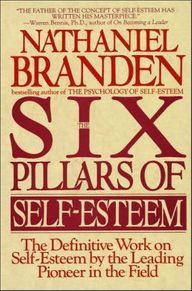50. The Six Pillars of Self Esteem - Nathaniel Brandon (📱)
01 Dec 2018
Reading Notes:
The turbulence of our times demands strong selves with a clear sense of identity, competence, and worth.
Of all the judgments we pass in life, none is as important as the one we pass on ourselves.
Self-esteem, fully realized, is the experience that we are appropriate to life and to the requirements of life.
self-esteem is:
-
Confidence in our ability to think, confidence in our ability to cope with the basic challenges of life; and
-
Confidence in our right to be successful and happy, the feeling of being worthy, deserving, entitled to assert our needs and wants, achieve our values, and enjoy the fruits of our efforts.
The higher our self-esteem, the stronger the drive to express ourselves, reflecting the sense of richness within. The lower our self-esteem, the more urgent the need to “prove” ourselves—or to forget ourselves by living mechanically and unconsciously. The higher our self-esteem, the more open, honest, and appropriate our communications are likely to be, because we believe our thoughts have value and therefore we welcome rather than fear clarity.
The idea by which some low-self-esteem people operate their love life. If you love me, obviously you are not good enough for me. Only someone who will reject me is an acceptable object of my devotion.
The tragedy of many people’s lives is that, given a choice between being “right” and having an opportunity to be happy, they invariably choose being “right.” That is the one ultimate satisfaction they allow themselves.
a person’s image of the future may be a better predictor of future attainment than his past performances.”
What we make an effort to learn and what we achieve is based, at least in part, on what we think is possible and appropriate to us.
The dread and disorientation that persons with poor self-esteem experience when life goes well in ways that conflict with their deepest view of themselves and of what is appropriate to them.
If my aim is to prove I am “enough,” the project goes on to infinity—because the battle was already lost on the day I conceded the issue was debatable.
Self-esteem has two interrelated components. One is a sense of basic confidence in the face of life’s challenges: self-efficacy. The other is a sense of being worthy of happiness: self-respect.
Self-efficacy means confidence in the functioning of my mind, in my ability to think, understand, learn, choose, and make decisions;
Self-respect means assurance of my value; an affirmative attitude toward my right to live and to be happy; comfort in appropriately asserting my thoughts, wants, and needs; the feeling that joy and fulfillment are my natural birthright.
In a world in which the total of human knowledge is doubling about every ten years, our security can rest only on our ability to learn.
If we respect ourselves, we tend to act in ways that confirm and reinforce this respect, such as requiring others to deal with us appropriately.